Local libraries are essential community resources that offer summer reading programs to combat learning loss in children, especially those from low-income families. These programs provide access to diverse books and engaging activities, helping kids maintain and improve their reading skills. You’ll find opportunities for family engagement, author visits, and fun challenges that foster a love for literacy. It’s a great way to keep your child engaged and learning all summer long, sparking even more interest in various offerings.
Key Takeaways
- Local libraries host summer reading programs that help prevent learning loss and enhance children’s reading skills during the summer months.
- Programs often include engaging activities like author visits, crafts, and reading challenges to motivate participants.
- Libraries collaborate with schools and community organizations to align initiatives and provide additional resources, such as meals and nutrition education.
- Digital platforms like Beanstack allow families to track reading progress and participate in virtual events, increasing accessibility.
- Summer reading programs promote family bonding and foster lifelong reading habits, benefiting children’s personal and academic development.
The Importance of Summer Reading Programs
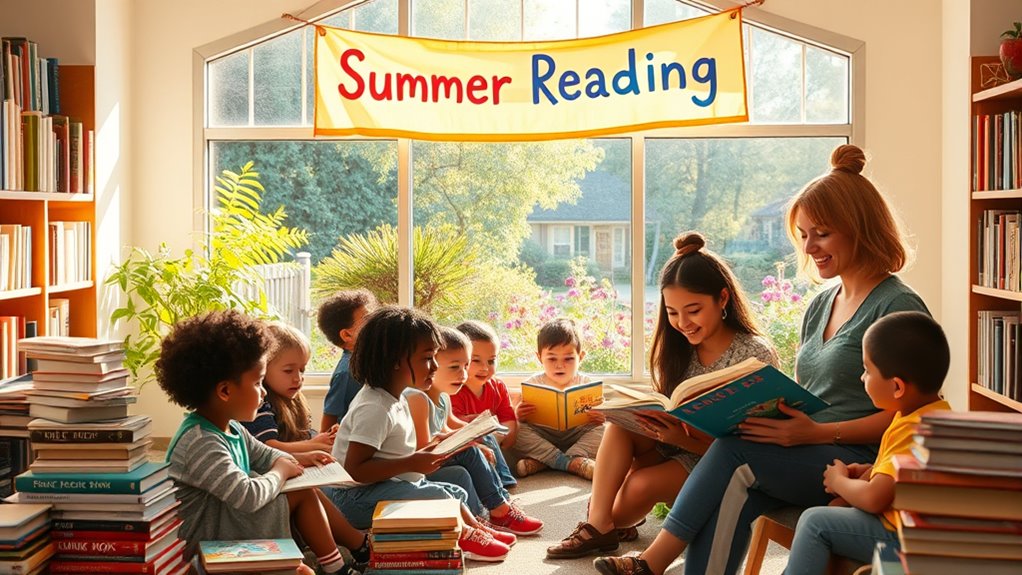
Why are summer reading programs so essential for your child’s development? They play a significant role in addressing summer learning loss, especially for kids from low-income families who often lose two months of reading skills each summer.
By participating in these programs, your child can maintain or even improve their reading abilities. Engaging with books keeps the “summer slide” at bay, preventing long-term academic setbacks.
Participating in summer reading programs helps your child maintain and enhance their reading skills, combating the “summer slide.”
Access to diverse reading materials through libraries is important; kids who read six or more books during the summer tend to retain their academic skills.
Plus, these programs often involve activities that engage parents, fostering a supportive environment for your child’s literacy growth and helping them cultivate consistent reading habits. Additionally, integrating educational toys into your child’s summer routine can further enhance their learning experience and keep them engaged in educational activities.
Benefits for Participants
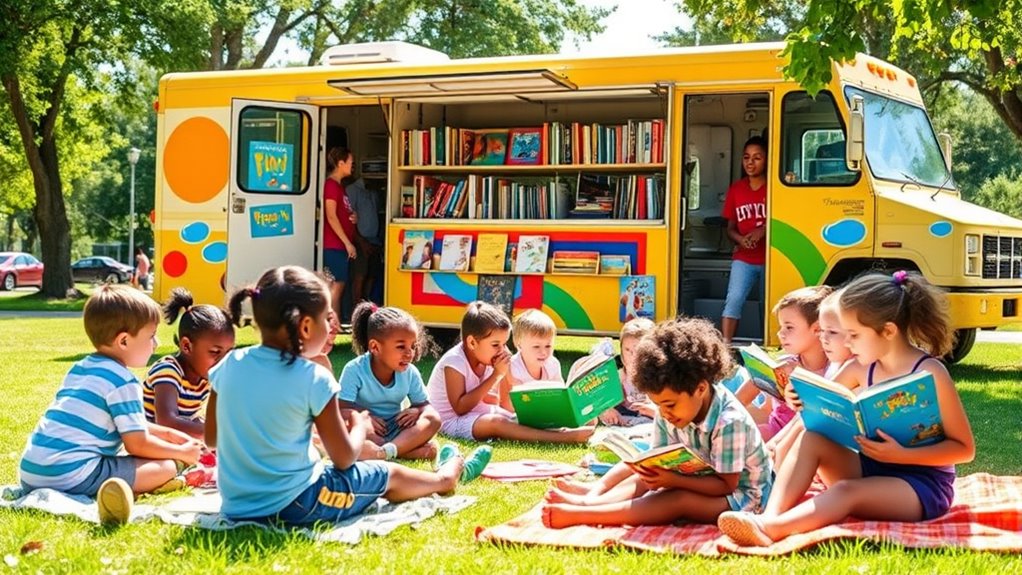
Participating in summer reading programs offers numerous benefits that can greatly enhance your child’s development. By engaging in reading during the summer, your child can maintain and improve their reading skills, boosting academic performance and cognitive growth.
These programs strengthen essential skills like phonemic awareness, vocabulary, and comprehension, while preventing learning loss. Additionally, they foster personal development by building confidence and encouraging social-emotional learning through interaction with peers.
You’ll notice your child’s focus and critical thinking skills sharpen as they explore diverse topics and genres. Reading also cultivates lifelong habits and provides opportunities for family bonding through shared experiences.
Ultimately, summer reading programs create a rich environment for exploration, growth, and connection.
Engaging Activities Offered
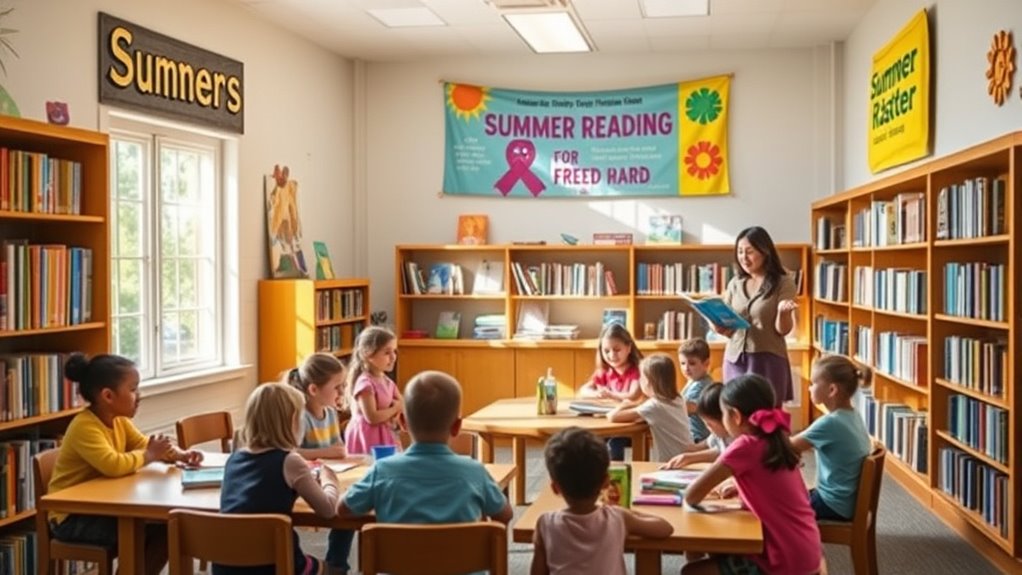
Local libraries create a vibrant atmosphere during summer reading programs, offering a variety of engaging activities that captivate children’s imaginations.
You can meet popular authors during special visits, making reading even more exciting. Join in on reader’s theater, where kids reenact their favorite stories, or participate in “Read and Play Dates” with your parents.
Libraries also host book-themed crafts to spark creativity. For a little friendly competition, try the reading challenges that encourage you to reach specific goals, complete with fun prizes!
Participate in book scavenger hunts or share your thoughts through book reviews. These activities not only inspire a love for reading but also help build community connections.
Get ready for an unforgettable summer!
Collaboration With Local Organizations
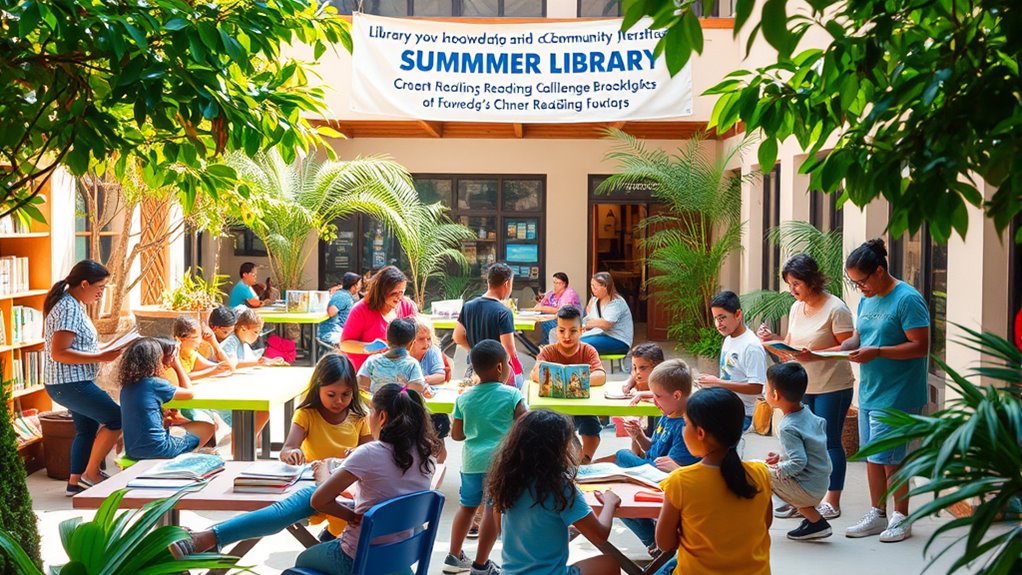
While summer reading programs thrive on engaging activities, their success often hinges on collaborations with local organizations. By partnering with schools, libraries can align reading initiatives with educational objectives, enhancing the overall experience for students.
Collaborative agreements define roles, ensuring effective communication and resource sharing, like lesson plans and reading materials. Working with community organizations also enriches these programs, offering additional resources such as free meals and nutrition education. These partnerships can also promote holistic living by introducing wellness topics that support overall health and well-being. Furthermore, these initiatives can help foster sustainable practices that encourage families to embrace eco-friendly habits.
Collaborative agreements enhance communication and resource sharing, enriching programs with valuable support like lesson plans and free meals.
These collaborations foster family engagement, encouraging parents to participate in literacy activities. Furthermore, local businesses can sponsor challenges and events, boosting visibility and community involvement.
Together, these collaborations not only enhance summer reading programs but also create a supportive network that emphasizes the importance of literacy for everyone. Additionally, transforming living spaces can further support seniors’ reading habits by creating inviting and accessible areas for them to enjoy books and participate in community programs.
Utilizing Technology for Enhanced Participation
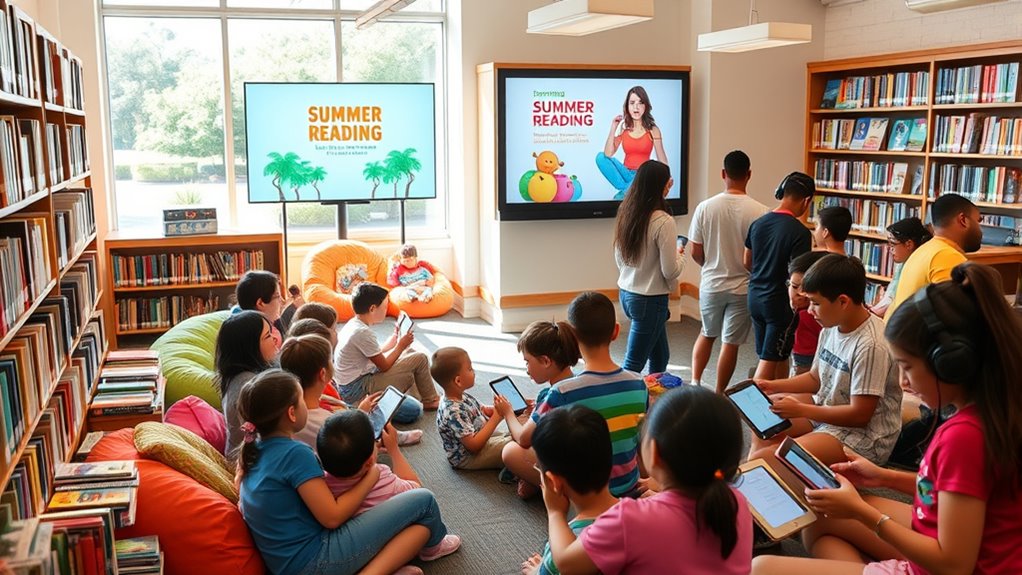
As summer reading programs evolve, libraries are increasingly turning to technology to boost participation and engagement. Digital platforms like Beanstack let you track your reading and earn badges, making the experience more fun.
Join social media groups to share book reviews and progress with fellow readers, or participate in online forums on GoodReads for deeper discussions. Libraries also host virtual events, like author readings, to reach those unable to attend in person.
Interactive apps, such as Scholastic’s Reading Timer, engage you by tracking your reading time creatively. Plus, workshops on eBooks help you gain tech skills.
With these tools, libraries create a vibrant community that encourages everyone to plunge into reading this summer!
Evaluating Program Effectiveness
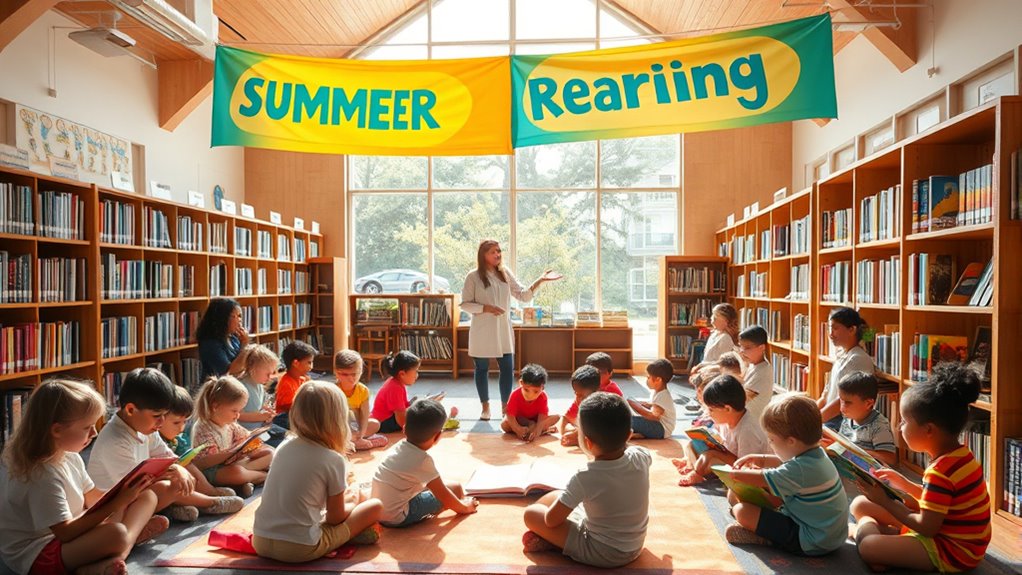
Evaluating the effectiveness of summer reading programs is essential to confirm they meet their goals and positively impact participants. You’ll want to track participation metrics, such as the number of children who sign up and complete the program.
Gathering both quantitative data, like test scores and reading levels, and qualitative feedback from students and parents can provide valuable insights into program satisfaction. Techniques such as propensity score matching and growth modeling can help you assess literacy development accurately.
Pay attention to stakeholder perspectives, including those of teachers and parents, as they often highlight increased confidence and readiness for the school year.
How to Get Involved and Support Your Library

Getting involved with your local library not only strengthens community ties but also enriches the lives of participants in various programs.
You can volunteer for library tasks like organizing materials, preparing crafts, or assisting with events. If you’re a teen, consider helping with dedicated programs to earn community service hours.
Joining the Friends of the Library lets you advocate and fundraise, such as organizing book sales. Libraries also seek volunteers for community projects like gardening and technology assistance.
To support summer reading programs, encourage family involvement and help promote events. Interested? Apply through your library’s website or in person, keeping an eye out for any required background checks.
Every contribution makes a difference in fostering a vibrant reading culture!
Frequently Asked Questions
What Age Groups Are Eligible for Summer Reading Programs?
You’ll find that summer reading programs cater to a variety of age groups.
Infants to preschoolers (birth-5 years) engage in interactive storytimes.
Children aged 6-12 participate in reading challenges and themed events.
Teens (13-18) can join book clubs and writing contests.
Finally, adults (18 and older) enjoy book discussions and workshops.
Each group has tailored activities to foster a love of reading and encourage participation across all ages.
Are There Any Costs Associated With Participating in These Programs?
No, you won’t find any costs associated with participating in most summer reading programs. They’re designed to be free and accessible for everyone.
You can enjoy activities, earn incentives, and track your progress without spending a dime. While some optional items might be available for purchase, like commemorative t-shirts, your participation itself won’t require any fees.
Immerse yourself in the fun and enriching experience without worrying about costs!
How Can I Volunteer for Summer Reading Programs at My Local Library?
To volunteer for summer reading programs at your local library, start by checking the library’s website for application details.
Most libraries require you to fill out an online or physical application, usually available in early spring. You’ll likely need to attend a training session before the program begins.
Look for roles that match your interests, and remember, flexible schedules can work around your availability while you earn community service hours!
What Types of Rewards Are Offered for Program Participation?
Imagine the thrill of uncovering hidden treasures after a summer of reading. You’ll find rewards like free books, gift cards, and virtual badges waiting for you.
Picture yourself snagging movie tickets or even a Nintendo Switch for your efforts! As you plunge into stories, you’ll also enjoy pizza rewards and exciting events.
Each milestone brings new prizes, turning your reading journey into an adventure filled with surprises and delightful experiences.
How Can Parents Support Their Children’s Participation in Summer Reading?
To support your child’s participation in summer reading, encourage them to explore different books and genres.
Set aside daily reading time together, making it a fun routine. You can also attend library events or book clubs to build excitement.
Reward their achievements, no matter how small, to keep them motivated. Discuss the stories they read, helping them connect and engage more deeply with the material.
Your involvement can make reading a shared adventure!
Conclusion
So, if you think summer reading programs at your local library are just a few books and some snacks, think again! They’re a magical gateway to adventure, learning, and community connection that’ll have your kids begging for more pages to turn. By diving into these programs, you’re not just boosting literacy—you’re launching a lifelong love for reading! Get involved, support your library, and watch as your community transforms into a bustling hub of imagination and knowledge!









